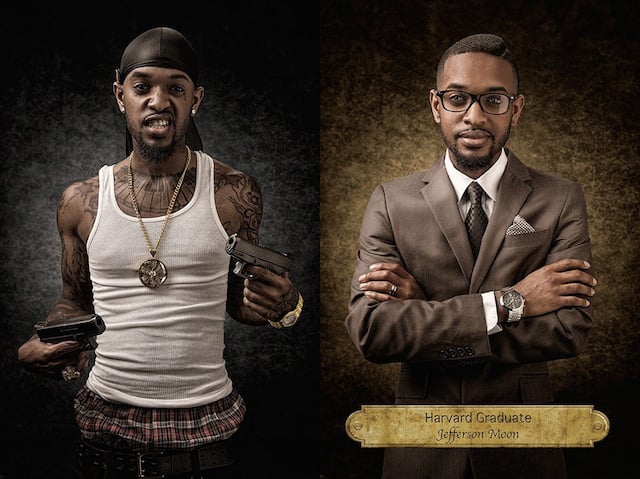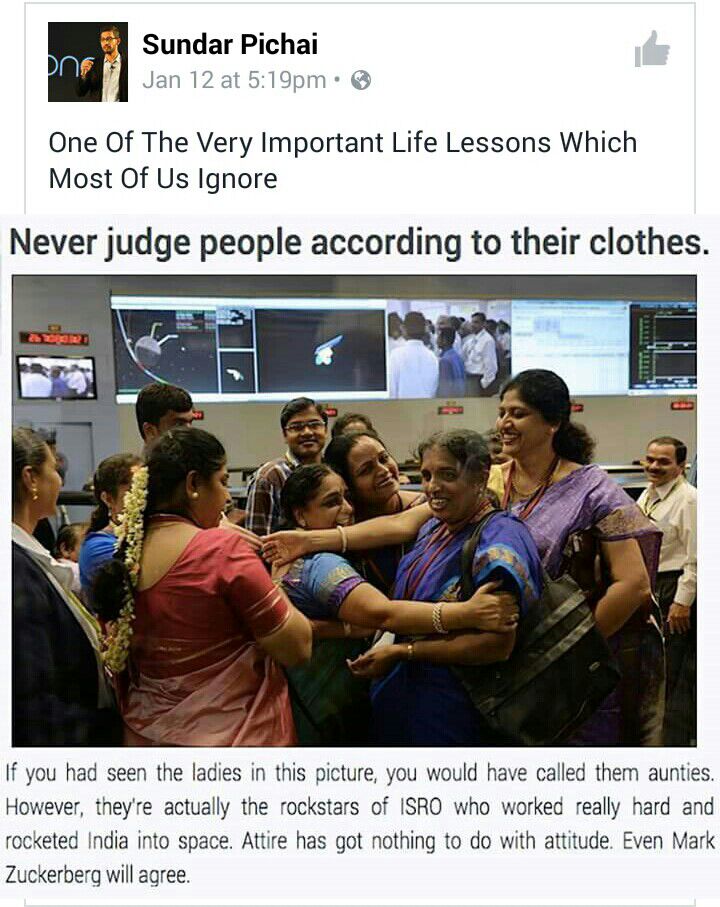-
This forum contains old posts that have been closed. New threads and replies may not be made here. Please navigate to the relevant forum to create a new thread or post a reply.
You are using an out of date browser. It may not display this or other websites correctly.
You should upgrade or use an alternative browser.
You should upgrade or use an alternative browser.
Never judge people according to their clothes!
- Thread starter vgane
- Start date
- Status
- Not open for further replies.
prasad1
Active member
True to a great extent. And more you know about the other person, your evaluation will be better. Having said that:
We make snap judgments about people from the clothes they wear. On what basis?
There is much more to our clothing choices than we might imagine. For many people, what they wear is merely a matter of habit, but when we dress in the morning it might pay us to be a little more careful in the choices we make. Doing something different with your clothes might be a way of changing the impression others have of you.
Two studies by our team in the UK and Turkey shows some of the very subtle ways in which clothing influences all kinds of impressions about us. Our clothes make a huge difference to what people think about us – and without us knowing or in ways we couldn’t even imagine. People make their assessments in the first few seconds of seeing another; assessments that go way beyond how well you are dressed and how neat and tidy you might look.
We carried out the research with over 300 adults (men and women). They looked at images of a man and a woman for just 3 seconds before making 'snap judgements' about them. In some of the pictures the man wore a made-to-measure suit. In others he wore a very similar off-the-peg suit bought on the high street. The differences in the suits were very minor – we controlled for all the big differences such as color and fabric, as well as making sure the face of the model was pixillated so that there could be no hidden messages in the facial expressions.
After just a 3-second exposure people judged the man more favourably in the bespoke suit. And the judgements were not about how well dressed he was.
They rated him as more confident, successful, flexible and a higher earner in a tailor-made suit than when he wore a high street equivalent. Since the model’s face in the pictures was blanked out these impressions must have been formed after quickly eyeing what he was wearing.
So, our clothes say a great deal about who we are and can signal a great deal of socially important things to others, even if the impression is actually unfounded. Research suggests that these impressions about us can start in childhood - one study found that teachers made assumptions about children's academic ability based on their clothing.
Once you are famous and successful like Mark Zuckerburg you need not care what others think of you, till that time cloths matter.
It is important to choose our dress style carefully because people will make all sorts of assumptions and decisions about us without proper evidence. We are unlikely to know what these assessments are too, so it is quite possible that our clothes reveal more than we thought.
Sartorial laziness is an easy habit to slip into. We may think that fashion is just profligate indulgence and our sunny personality will eclipse our dull attire or detract from the soup stains on our anorak. Untrue. What we wear speaks volumes in just a few seconds. Dressing to impress really is worthwhile and could even be the key to success.
https://www.psychologytoday.com/blog/do-something-different/201304/what-your-clothes-might-be-saying-about-you
If the same group of ladies wore lab coats and pants, would your evaluation of these fine ladies Change?
So it is not the dress that matters, but the knowledge of the person seeing the dress that matters.
We make snap judgments about people from the clothes they wear. On what basis?
There is much more to our clothing choices than we might imagine. For many people, what they wear is merely a matter of habit, but when we dress in the morning it might pay us to be a little more careful in the choices we make. Doing something different with your clothes might be a way of changing the impression others have of you.
Two studies by our team in the UK and Turkey shows some of the very subtle ways in which clothing influences all kinds of impressions about us. Our clothes make a huge difference to what people think about us – and without us knowing or in ways we couldn’t even imagine. People make their assessments in the first few seconds of seeing another; assessments that go way beyond how well you are dressed and how neat and tidy you might look.
We carried out the research with over 300 adults (men and women). They looked at images of a man and a woman for just 3 seconds before making 'snap judgements' about them. In some of the pictures the man wore a made-to-measure suit. In others he wore a very similar off-the-peg suit bought on the high street. The differences in the suits were very minor – we controlled for all the big differences such as color and fabric, as well as making sure the face of the model was pixillated so that there could be no hidden messages in the facial expressions.
After just a 3-second exposure people judged the man more favourably in the bespoke suit. And the judgements were not about how well dressed he was.
They rated him as more confident, successful, flexible and a higher earner in a tailor-made suit than when he wore a high street equivalent. Since the model’s face in the pictures was blanked out these impressions must have been formed after quickly eyeing what he was wearing.
So, our clothes say a great deal about who we are and can signal a great deal of socially important things to others, even if the impression is actually unfounded. Research suggests that these impressions about us can start in childhood - one study found that teachers made assumptions about children's academic ability based on their clothing.
Once you are famous and successful like Mark Zuckerburg you need not care what others think of you, till that time cloths matter.
It is important to choose our dress style carefully because people will make all sorts of assumptions and decisions about us without proper evidence. We are unlikely to know what these assessments are too, so it is quite possible that our clothes reveal more than we thought.
Sartorial laziness is an easy habit to slip into. We may think that fashion is just profligate indulgence and our sunny personality will eclipse our dull attire or detract from the soup stains on our anorak. Untrue. What we wear speaks volumes in just a few seconds. Dressing to impress really is worthwhile and could even be the key to success.
https://www.psychologytoday.com/blog/do-something-different/201304/what-your-clothes-might-be-saying-about-you
If the same group of ladies wore lab coats and pants, would your evaluation of these fine ladies Change?
So it is not the dress that matters, but the knowledge of the person seeing the dress that matters.
Last edited:
The Controller General, Ministry of Finance, Government of India, had visited Chennai in 2008. I have had a chance to host on behalf of my Bank and accompany him to Sriharikotta.
There, the entire top team of ISRO scientists were very simple in dress.
I was very much ashamed of myself for being in suit and coat before those great scientists, who were all very simple by all means.
There, the entire top team of ISRO scientists were very simple in dress.
I was very much ashamed of myself for being in suit and coat before those great scientists, who were all very simple by all means.
Till the British were there InDian officials in whatever field invariably wore aSuit. It was right then. at that period of time.But later after 80s there was no insistence to wear Suits except on some social gatherings it used to be informally announced to come in Suits These were far & few.
After 90si all were given the freedom to attend a function in a decent manner, & people felt relieved , more so if it is Summer? relaxed ESP. If it is Summer to wear even a pant & half sleeve / T- shirts were also accepted as decent.
In winter , people wait for an opportunity to wear Suites/Ties & many would follow, at least they get an occasion to take out their old Suits.
Rishikesan ( A.Srnivasan )
After 90si all were given the freedom to attend a function in a decent manner, & people felt relieved , more so if it is Summer? relaxed ESP. If it is Summer to wear even a pant & half sleeve / T- shirts were also accepted as decent.
In winter , people wait for an opportunity to wear Suites/Ties & many would follow, at least they get an occasion to take out their old Suits.
Rishikesan ( A.Srnivasan )
Raji Ram
Active member
We are judged by what we wear. Best is to dress up according to the occasion. For example, a shiny saree and more jewelry
will not suit a condolence meeting but it is necessary when we attend good functions.
P.S: A shop keeper often calls me 'ammA' but 'akkA' when I have a pony-tail! So, my hair style decides my age!! :lol:
will not suit a condolence meeting but it is necessary when we attend good functions.
P.S: A shop keeper often calls me 'ammA' but 'akkA' when I have a pony-tail! So, my hair style decides my age!! :lol:
We attended a Sikh marriage in a Gurudwara with my better half bedecked in Conjeevaram....Later we realised that it was not appropriate as most of the guests wore simple dressWe are judged by what we wear. Best is to dress up according to the occasion. For example, a shiny saree and more jewelry
will not suit a condolence meeting but it is necessary when we attend good functions.
P.S: A shop keeper often calls me 'ammA' but 'akkA' when I have a pony-tail! So, my hair style decides my age!! :lol:
The shop keepers very well know the ladies psychology!!We are judged by what we wear. Best is to dress up according to the occasion. For example, a shiny saree and more jewelry
will not suit a condolence meeting but it is necessary when we attend good functions.
P.S: A shop keeper often calls me 'ammA' but 'akkA' when I have a pony-tail! So, my hair style decides my age!! :lol:
hi
ஆள் பாதி ....ஆடை பாதி....
tbs ji,
ஆள் பாதி .... first half
ஆடை பாதி.... second half
Whether the proverb holds good when the first half ...........is half of half ?

It is the same person, but the person on the left gives one perception and the one on the right gives different perception. So cloths do make a difference in how we judge others.
For many people dress creates better impression !!
Raji Ram
Active member
I meant only the brahmin weddings!We attended a Sikh marriage in a Gurudwara with my better half bedecked in Conjeevaram....Later we realised that it was not appropriate as most of the guests wore simple dress
MAmis, athais and nAththanAr wear madisAr sarees with traditional jewelry, in many weddings! :thumb:
- Status
- Not open for further replies.
Similar threads
- Replies
- 4
- Views
- 2K
- Replies
- 0
- Views
- 434
- Locked
- Replies
- 3
- Views
- 2K

